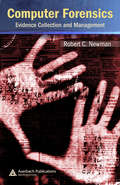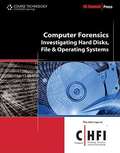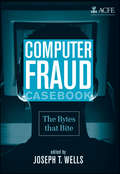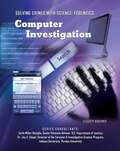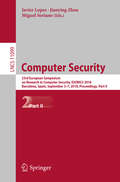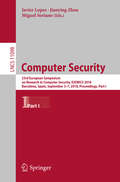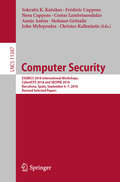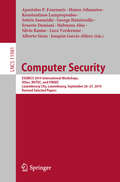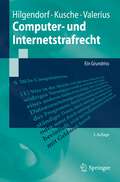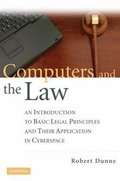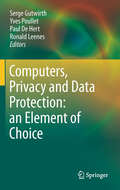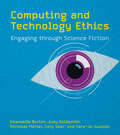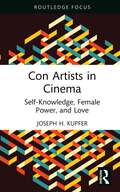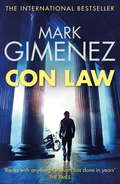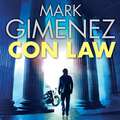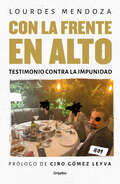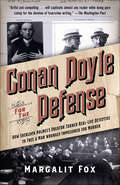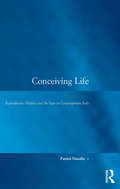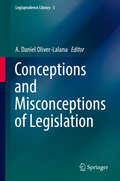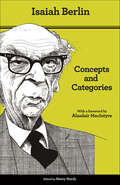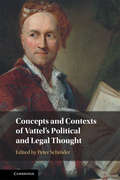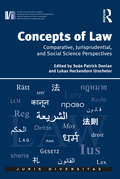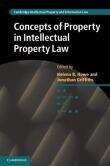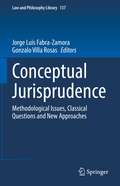- Table View
- List View
Computer Forensics: Evidence Collection and Management
by Robert C. NewmanComputer Forensics: Evidence Collection and Management examines cyber-crime, E-commerce, and Internet activities that could be used to exploit the Internet, computers, and electronic devices. The book focuses on the numerous vulnerabilities and threats that are inherent on the Internet and networking environments and presents techniques and suggestions for corporate security personnel, investigators, and forensic examiners to successfully identify, retrieve, and protect valuable forensic evidence for litigation and prosecution. The book is divided into two major parts for easy reference. The first part explores various crimes, laws, policies, forensic tools, and the information needed to understand the underlying concepts of computer forensic investigations. The second part presents information relating to crime scene investigations and management, disk and file structure, laboratory construction and functions, and legal testimony. Separate chapters focus on investigations involving computer systems, e-mail, and wireless devices. Presenting information patterned after technical, legal, and managerial classes held by computer forensic professionals from Cyber Crime Summits held at Kennesaw State University in 2005 and 2006, this book is an invaluable resource for thosewho want to be both efficient and effective when conducting an investigation.
Computer Forensics: Investigating Hard Disks, File and Operating Systems:
by EC-CouncilThe text provides the knowledge and skills to identify, track, and prosecute the cyber-criminal. The series is comprised of five books covering a broad base of topics in Computer Hacking Forensic Investigation, designed to expose the reader to the process of detecting attacks and collecting evidence in a forensically sound manner with the intent to report crime and prevent future attacks.
Computer Fraud Casebook: The Bytes that Bite
by Joseph T. WellsThis one-of-a-kind collection consists of actual cases written by fraud examiners out in the field. These cases were hand selected from hundreds of submissions and together form a comprehensive picture of the many types of computer fraud how they are investigated, across industries and throughout the world. Topics included are email fraud, on-line auction fraud, security breaches, counterfeiting, and others.
Computer Investigation (Solving Crimes With Science: Forensics #12)
by Elizabeth BauchnerThe digital age we entered in the twenty-first century has rapidly become an age of digital crime. Cybercrimes like spoofing, phishing, and hacking are on the rise, and computer forensic technicians are on the case. Even "traditional" crimes like murder, fraud, and child abuse can be both facilitated by computers--and solved through computer investigation. Computer Investigation helps readers understand how cybercrimes are committed, and how investigators help solve them and bring the perpetrators to justice. Readers will also gain a few tips for protecting themselves online and protecting their computers from intrusions and hacks.
Computer Security: 14th International Conference, Isc 2011, Xi'an, China, October 26-29, 2011, Proceedings (Lecture Notes In Computer Science / Security And Cryptology Ser. #3650)
by Javier Lopez Jianying Zhou Miguel SorianoThe two-volume set, LNCS 11098 and LNCS 11099 constitutes the refereed proceedings of the 23nd European Symposium on Research in Computer Security, ESORICS 2018, held in Barcelona, Spain, in September 2018.The 56 revised full papers presented were carefully reviewed and selected from 283 submissions. The papers address issues such as software security, blockchain and machine learning, hardware security, attacks, malware and vulnerabilities, protocol security, privacy, CPS and IoT security, mobile security, database and web security, cloud security, applied crypto, multi-party computation, SDN security.
Computer Security: 14th International Conference, Isc 2011, Xi'an, China, October 26-29, 2011, Proceedings (Lecture Notes In Computer Science / Security And Cryptology Ser. #3650)
by Javier Lopez Jianying Zhou Miguel SorianoThe two-volume set, LNCS 11098 and LNCS 11099 constitutes the refereed proceedings of the 23nd European Symposium on Research in Computer Security, ESORICS 2018, held in Barcelona, Spain, in September 2018.The 56 revised full papers presented were carefully reviewed and selected from 283 submissions. The papers address issues such as software security, blockchain and machine learning, hardware security, attacks, malware and vulnerabilities, protocol security, privacy, CPS and IoT security, mobile security, database and web security, cloud security, applied crypto, multi-party computation, SDN security.
Computer Security: ESORICS 2018 International Workshops, CyberICPS 2018 and SECPRE 2018, Barcelona, Spain, September 6–7, 2018, Revised Selected Papers (Lecture Notes in Computer Science #11387)
by John Mylopoulos Frédéric Cuppens Costas Lambrinoudakis Sokratis K. Katsikas Nora Cuppens Christos Kalloniatis Annie Antón Stefanos GritzalisThis book constitutes the thoroughly refereed post-conference proceedings of the 4th International Workshop on the Security of Industrial Control Systems and Cyber-Physical Systems, CyberICPS 2018, and the Second International Workshop on Security and Privacy Requirements Engineering, SECPRE 2018, held in Barcelona, Spain, in September 2018, in conjunction with the 23rd European Symposium on Research in Computer Security, ESORICS 2018. The CyberICPS Workshop received 15 submissions from which 8 full papers were selected for presentation. They cover topics related to threats, vulnerabilities and risks that cyber-physical systems and industrial control systems face; cyber attacks that may be launched against such systems; and ways of detecting and responding to such attacks. From the SECPRE Workshop 5 full papers out of 11 submissions are included. The selected papers deal with aspects of security and privacy requirements assurance and evaluation; and security requirements elicitation and modelling.
Computer Security: ESORICS 2019 International Workshops, IOSec, MSTEC, and FINSEC, Luxembourg City, Luxembourg, September 26–27, 2019, Revised Selected Papers (Lecture Notes in Computer Science #11981)
by Joaquin Garcia-Alfaro Silvio Ranise Ernesto Damiani Sotiris Ioannidis Apostolos P. Fournaris Konstantinos Lampropoulos Manos Athanatos George Hatzivasilis Habtamu Abie Luca Verderame Alberto SienaThis book constitutes the refereed post-conference proceedings of the Second International Workshop on Information & Operational Technology (IT & OT) security systems, IOSec 2019 , the First International Workshop on Model-driven Simulation and Training Environments, MSTEC 2019, and the First International Workshop on Security for Financial Critical Infrastructures and Services, FINSEC 2019, held in Luxembourg City, Luxembourg, in September 2019, in conjunction with the 24th European Symposium on Research in Computer Security, ESORICS 2019. The IOSec Workshop received 17 submissions from which 7 full papers were selected for presentation. They cover topics related to security architectures and frameworks for enterprises, SMEs, public administration or critical infrastructures, threat models for IT & OT systems and communication networks, cyber-threat detection, classification and pro ling, incident management, security training and awareness, risk assessment safety and security, hardware security, cryptographic engineering, secure software development, malicious code analysis as well as security testing platforms. From the MSTEC Workshop 7 full papers out of 15 submissions are included. The selected papers deal focus on the verification and validation (V&V) process, which provides the operational community with confidence in knowing that cyber models represent the real world, and discuss how defense training may benefit from cyber models. The FINSEC Workshop received 8 submissions from which 3 full papers and 1 short paper were accepted for publication. The papers reflect the objective to rethink cyber-security in the light of latest technology developments (e.g., FinTech, cloud computing, blockchain, BigData, AI, Internet-of-Things (IoT), mobile-first services, mobile payments).
Computer- und Internetstrafrecht: Ein Grundriss (Springer-Lehrbuch)
by Brian Valerius Eric Hilgendorf Carsten KuscheDie Informations- und Kommunikationstechnologie stellt das Strafrecht vor die Aufgabe, sowohl klassische Delikte in ihrem neuen technisierten Gewand zu erfassen als auch ganz neuen Kriminalitätsformen zu begegnen. Das Lehrbuch vermittelt einen umfassenden Überblick über das Rechtsgebiet und zeigt die aktuellen Probleme auf. Die 2. Auflage berücksichtigt Entwicklungen in Gesetzgebung und Rechtsprechung und enthält ein neues Kapitel zu strafverfahrensrechtlichen Fragen im Zusammenhang mit Computern und Computernetzwerken.
Computers and the Law: An Introduction to Basic Legal Principles and Their Application in Cyberspace
by Robert DunneComputers and the Law provides readers with an introduction to the legal issues associated with computing - particularly in the massively networked context of the Internet. Assuming no previous knowledge of the law or any special knowledge of programming or computer science, this textbook offers undergraduates of all disciplines and professionals in the computing industry an understanding of basic legal principles and an awareness of the peculiarities associated with legal issues in cyberspace. This book introduces readers to the fundamental workings of the law in physical space and suggests the opportunity to create new types of laws with nontraditional goals.
Computers, Privacy and Data Protection: An Element Of Choice
by Paul De Hert Yves Poullet Serge Gutwirth Ronald LeenesThis timely interdisciplinary work on current developments in ICT and privacy/data protection, coincides as it does with the rethinking of the Data Protection Directive, the contentious debates on data sharing with the USA (SWIFT, PNR) and the judicial and political resistance against data retention. The authors of the contributions focus on particular and pertinent issues from the perspective of their different disciplines which range from the legal through sociology, surveillance studies and technology assessment, to computer sciences. Such issues include cutting-edge developments in the field of cloud computing, ambient intelligence and PETs; data retention, PNR-agreements, property in personal data and the right to personal identity; electronic road tolling, HIV-related information, criminal records and teenager's online conduct, to name but a few.
Computing and Technology Ethics: Engaging through Science Fiction
by Emanuelle Burton Judy Goldsmith Nicholas Mattei Cory Siler Sara-Jo SwiatekA new approach to teaching computing and technology ethics using science fiction stories.Should autonomous weapons be legal? Will we be cared for by robots in our old age? Does the efficiency of online banking outweigh the risk of theft? From communication to travel to medical care, computing technologies have transformed our daily lives, for better and for worse. But how do we know when a new development comes at too high a cost? Using science fiction stories as case studies of ethical ambiguity, this engaging textbook offers a comprehensive introduction to ethical theory and its application to contemporary developments in technology and computer science. Computing and Technology Ethics: Engaging through Science Fiction first introduces the major ethical frameworks: deontology, utilitarianism, virtue ethics, communitarianism, and the modern responses of responsibility ethics, feminist ethics, and capability ethics. It then applies these frameworks to many of the modern issues arising in technology ethics including privacy, computing, and artificial intelligence. A corresponding anthology of science fiction brings these quandaries to life and challenges students to ask ethical questions of themselves and their work. Uses science fiction case studies to make ethics education engaging and fun Trains students to recognize, evaluate, and respond to ethical problems as they ariseFeatures anthology of short stories from internationally acclaimed writers including Ken Liu, Elizabeth Bear, Paolo Bacigalupi, and T. C. Boyle to animate ethical challenges in computing technology Written by interdisciplinary author team of computer scientists and ethical theoristsIncludes a robust suite of instructor resources, such as pedagogy guides, story frames, and reflection questions
Con Artists in Cinema: Self-Knowledge, Female Power, and Love (Routledge Focus on Film Studies)
by Joseph H. KupferThis book examines the con artist film as a genre, exploring its main features while also addressing variations within it. The volume explores three diverse themes of the con artist film: edification, self-awareness, and liberation through con games; the femme fatale as con artist; and romantic love as a plot point. Analyzing movies such as Matchstick Men (2003), House of Games (1987), Body Heat (1981), The Last Seduction (1994), Birthday Girl (2001), and The Game (1997), the book also explores their psychological investigation of the con artist figure, the con artist’s mark, and how the dynamic between these roles implicates us as the audience. It also addresses the con artist film genre’s close association with neo-noir, especially through the femme fatale figure, investigating and updating the rich tradition of noir film. Demonstrating the range and flexibility of this understudied genre, this book will be of interest to scholars and students of film studies, ethics, and those studying the representation of women in film..
Con Law
by Mark GimenezJohn Bookman - Book to his friends - is a tenured professor at the University of Texas School of Law. He's thirty-five, handsome and unmarried. He teaches Constitutional Law, reduces senators to blithering fools on talk shows, and is often mentioned as a future Supreme Court nominee. But Book is also famous for something more unusual. He likes to take on lost causes and win. Consequently, when he arrives at the law school each Monday morning, hundreds of letters await him, letters from desperate Americans around the country seeking his help. Every now and then, one letter captures his attention and Book feels compelled to act.In the first of a thrilling new series from the author of international bestsellers The Colour of Law and Accused, Book investigates a murder set in the high-stakes world of fracking and corruption in deepest, darkest Texas.
Con Law
by Mark GimenezJohn Bookman - Book to his friends - is a tenured professor at the University of Texas School of Law. He's thirty-five, handsome and unmarried. He teaches Constitutional Law, reduces senators to blithering fools on talk shows, and is often mentioned as a future Supreme Court nominee. But Book is also famous for something more unusual. He likes to take on lost causes and win. Consequently, when he arrives at the law school each Monday morning, hundreds of letters await him, letters from desperate Americans around the country seeking his help. Every now and then, one letter captures his attention and Book feels compelled to act.In the first of a thrilling new series from the author of international bestsellers The Colour of Law and Accused, Book investigates a murder set in the high-stakes world of fracking and corruption in deepest, darkest Texas.
Con la frente en alto: Testimonio contra la impunidad
by Lourdes MendozaPRÓLOGO DE CIRO GÓMEZ LEYVA "Sin el testimonio y la memoria la civilización no avanza. Con estas páginas, Lourdes Mendoza nos regala su testimonio de las duras batallas que como mujer, como madre, como periodista ha librado para obtener justicia, preservar su honor y ser ejemplo para Dany, su hija. Con valentía, con profesionalismo, con emociones encontradas, Lourdes nos comparte la memoria de su lucha triunfante por la dignidad." -Andrés Pastrana, expresidente de Colombia. La crítica dice: "Los Lozoya se metieron con la persona equivocada. Trataron de sumirla y sumarla al pantano de hostigamiento y estigmatización que padece la prensa en nuestros días, despertando así a una periodista y madre aguerrida que los exhibió y venció en tribunales. Con la franqueza y claridad que la caracteriza, Lourdes comparte una historia que nos recuerda que lo personal también es político; que las mentiras acaban carreras (y vidas) enteras; y que la batalla por la libertad de expresión está más vigente que nunca." -Leopoldo Maldonado, director regional de artículo 19 "Este texto es mucho más que una narrativa escrita con un corazón dolorido, con la mano firme de una periodista injustamente lastimada en su dignidad por el poder. Se trata de una sincera y profunda reflexión sobre una cruenta lucha entre la ignominia que busca encubrirse con la mentira y el engaño, por un lado, y el empeño históricamente renovado por que aflore la verdad del otro. Este texto es su Antígona, expresión de una mujer mexicana, de una orgullosa madre resiliente y con la frente en alto ante el poder." -Emilio Rabasa, Doctor en Derecho "La prosa de Lourdes Mendoza te atrapa por fluida y porque la respalda una información pesada por precisa. En el trasfondo está un hecho: en México lo normal es que ganen los corruptos. En esta ocasión la periodista (Lourdes) ya derrotó en primera y segunda instancia a Emilio Lozoya. También lo destrozó mediáticamente y sus fotografías mostrándolo en un restaurante de lujo lo tienen tras las rejas. Recomiendo esta crónica que alimenta la creencia de que en México sí puede haber justicia." -Sergio Aguayo, profesor investigador de el Colegio de México
Conan Doyle for the Defense: The True Story of a Sensational British Murder, a Quest for Justice, and the World's Most Famous Detective Writer
by Margalit FoxIn this thrilling true-crime procedural, the creator of Sherlock Holmes uses his unparalleled detective skills to exonerate a German Jew wrongly convicted of murder. <P><P>For all the scores of biographies of Arthur Conan Doyle, creator of the most famous detective in the world, there is no recent book that tells this remarkable story—in which Conan Doyle becomes a real-life detective on an actual murder case. In Conan Doyle for the Defense, Margalit Fox takes us step by step inside Conan Doyle’s investigative process and illuminates a murder mystery that is also a morality play for our time—a story of ethnic, religious, and anti-immigrant bias. In 1908, a wealthy woman was brutally murdered in her Glasgow home. The police found a convenient suspect in Oscar Slater—an immigrant Jewish cardsharp—who, despite his obvious innocence, was tried, convicted, and consigned to life at hard labor in a brutal Scottish prison. Conan Doyle, already world famous as the creator of Sherlock Holmes, was outraged by this injustice and became obsessed with the case. Using the methods of his most famous character, he scoured trial transcripts, newspaper accounts, and eyewitness statements, meticulously noting myriad holes, inconsistencies, and outright fabrications by police and prosecutors. Finally, in 1927, his work won Slater’s freedom.
Conceiving Life: Reproductive Politics and the Law in Contemporary Italy (Law, Justice And Power Ser.)
by Patrick HanafinThis volume examines the evolution of reproductive law in Italy from the `far west' of the 1980s and 90s through to one of the most potentially restrictive systems in Europe. The book employs an array of sociological, philosophical and legal material in order to discover why such a repressive piece of legislation has been produced at the end of a period of substantial change in the dynamic of gender relations in Italy. The book also discusses Italian policy within the wider European policy framework.
Conceiving Normalcy
by Elizabeth C. BrittThrough the processes of normalization, "fertile" and "infertile" become cultural categories that frame our understanding of families, parenting, gender roles, and more
Conceptions and Misconceptions of Legislation (Legisprudence Library #5)
by A. Daniel Oliver-LalanaThis volume brings together an international group of legal scholars to discuss different approaches to lawmaking. As well as reflecting the diversity of legisprudence as a re-emerging academic field, it offers a broad overview of current developments and challenges in the theory of legislation, and aspires, moreover, to counterbalance some questionable ideas or misconceptions, widespread among jurists, on what making laws entails. The book is organized into three parts. The first comprises a sample of ‘ways and models of legislation’, ranging from classic legislative ideals to contemporary forms of regulation. The essays in this part, variances of focus notwithstanding, revolve around the notions of legislative rationality, quality, effectiveness, and legitimacy, which may be regarded as the cornerstones of legisprudence. Interwoven with these notions is another core legisprudential concern: the justification of laws. We address it separately in the next part by exploring the connection between lawmaking, argumentation and constitutional democracy: under the heading ‘legislation in a culture of justification’, a number of aspects of this connection are tackled that have not been sufficiently considered so far in legisprudential literature, such as the intricacies of legislative reasoning and balancing, or the justificatory problems posed by special-interest legislation. The under privileged status of legisprudence in legal studies and the need for socially attentive and citizen-oriented legislative research come to the fore in the third part of the book which turns to the relationships between ‘legisprudence, lawyers, and citizens’. All in all, the thirteen articles gathered here provide a stimulating insight into the theory of legislation, and can hopefully contribute to the reconciliation of the study of law and the study of its making.
Concepts and Categories: Philosophical Essays - Second Edition
by Isaiah Berlin"The goal of philosophy is always the same, to assist men to understand themselves and thus to operate in the open, not wildly in the dark."--Isaiah Berlin This volume of Isaiah Berlin's essays presents the sweep of his contributions to philosophy from his early participation in the debates surrounding logical positivism to his later work, which more evidently reflects his life-long interest in political theory, the history of ideas, and the philosophy of history. Here Berlin describes his view of the nature of philosophy, and of its main task: to uncover the various models and presuppositions--the concepts and categories--that men bring to their existence and that help form that existence. Throughout, his writing is informed by his intense consciousness of the plurality of values, the nature of historical understanding, and of the fragility of human freedom in the face of rigid dogma. This new edition adds a number of previously uncollected pieces that throw further light on Berlin's central philosophical concerns, and a revealing exchange of letters with the editor and Bernard Williams about the genesis of the book.
Concepts and Contexts of Vattel's Political and Legal Thought
by Peter SchröderSwiss-born Emer de Vattel (1714–1767) was one of the last eminent thinkers of natural law. He shaped the later part of early-modern natural jurisprudence. At the time, the subject had become a fashionable academic sub-discipline in both jurisprudence and philosophy. Vattel's considerable impact on statesmen, political thinkers, diplomats and lawyers during his lifetime and after rested primarily on the fact that his The Law of Nations (1758) transformed natural law into the basis of a more comprehensive and practicable theory of interstate relations. His ideas served to promote reform programmes whose comprehensive natures spanned the domains of economic reform, constitutionalism and international diplomacy and foreign trade policy. Vattel's conception centred round the principle that defined all sovereign states as nations composed of societies of free men and profoundly influenced legal and political debates in the eighteenth and nineteenth centuries.
Concepts of Law: Comparative, Jurisprudential, and Social Science Perspectives (Juris Diversitas)
by Lukas Heckendorn UrschelerDebates surrounding the concept of law are not new. For a wide variety of reasons and in a wide variety of ways, the meaning of 'law' has long been an important part of Western thought, both within legal scholarship and beyond. The contributors to Concepts of Law are international experts from the fields of comparative law, legal philosophy, and the social sciences. Combining theoretical analyses with case studies, they explore various legal concepts and contexts from diverse national and disciplinary perspectives. Legal and normative pluralism is a theme throughout. Some chapters discuss the development of state law and legal systems. Others wrestle with law’s rhetoric and the potential utility of alternative vocabularies, e.g., 'governance' and ’governmentality’. Others reveal the rich polyjurality of the present, from the local to the global. The result is a rich picture of both present scholarship on laws and norms and the state of contemporary legal complexity, each crossing traditional boundaries.
Concepts of Property in Intellectual Property Law
by Helena R. Howe Jonathan GriffithsIntellectual property law faces the challenge of balancing the interests of right holders and users in the face of technological change and inequalities in information access. Concepts of Property in Intellectual Property Law offers a collection of essays which reflect on the interaction between intellectual property and broader, more traditional, notions of property. It explores the way in which differing interpretations of the concept of property can affect the scope of protection in the law of copyright, patent, trade marks and confidential information. With contributions from leading and emerging scholars from a variety of jurisdictions, the book demonstrates how concepts of property can assist in shaping a conceptually coherent and balanced response to the challenges faced by intellectual property law.
Conceptual Jurisprudence: Methodological Issues, Classical Questions and New Approaches (Law and Philosophy Library #137)
by Jorge Luis Fabra-Zamora Gonzalo Villa RosasThis book brings together leading legal theorists to present original philosophical work on the concept of law - the central question of jurisprudence. It covers five broad topics: firstly it addresses debates concerning the methodology of jurisprudence. In Part II it focuses on the notion of a legal system and its coercive nature, while Part III explores the relationships between law and morality, the traditional point of contention between positivist and non-positivist theories of law. Part IV then examines questions regarding law’s normative character and relationships with practical reason. Lastly, the final part introduces two novel theoretical approaches to conceptual jurisprudence.
